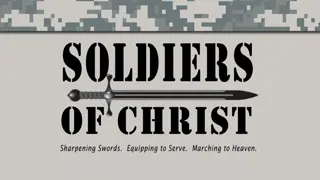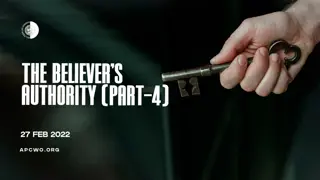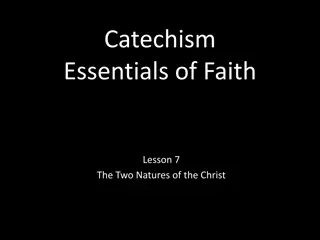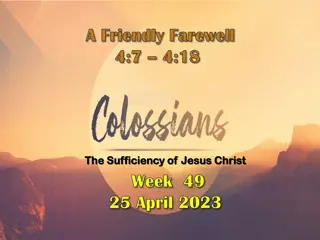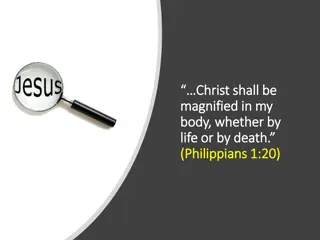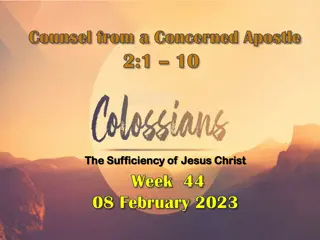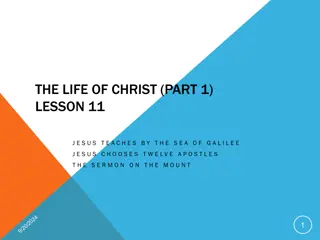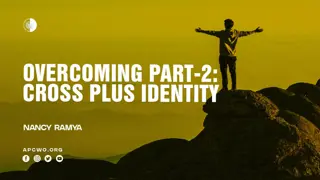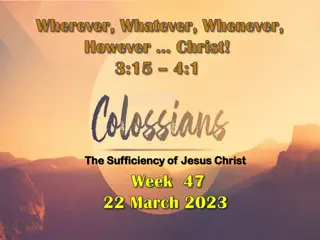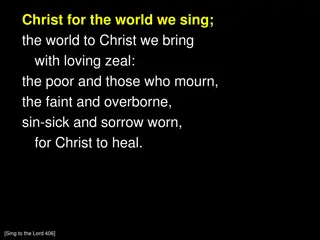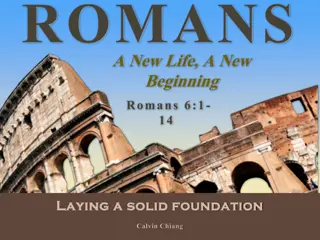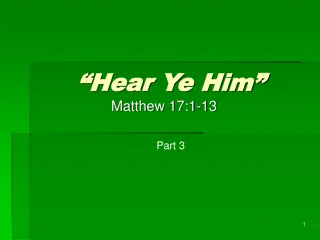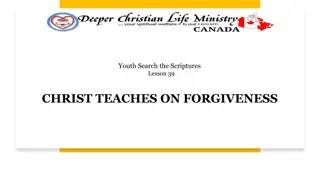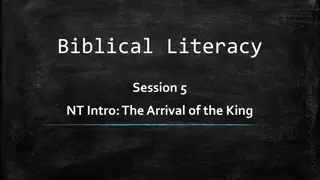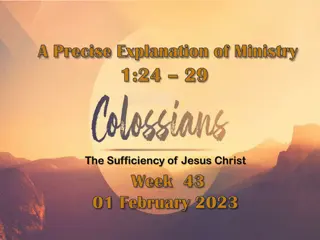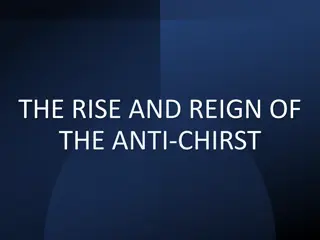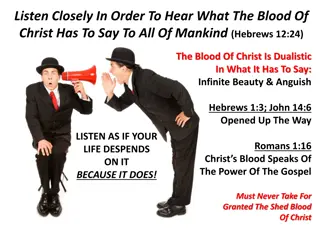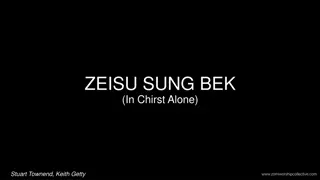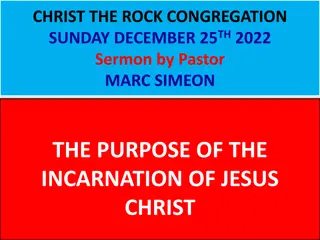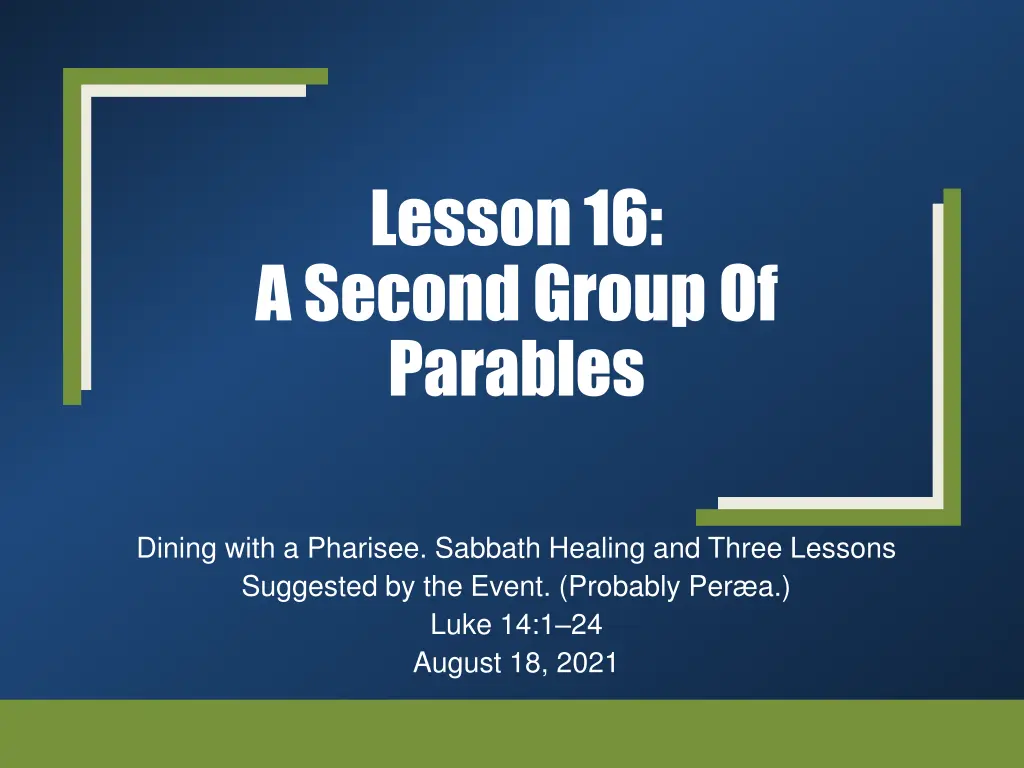
Parables on Pride and Hospitality Lessons
Explore parables on pride and lessons on hospitality from the event described in Luke 14:1-24. Reflect on humility, pride, hospitality, and blessings from selfless actions. Discover insights on seating etiquette and the importance of genuine hospitality as taught by Jesus.
Download Presentation

Please find below an Image/Link to download the presentation.
The content on the website is provided AS IS for your information and personal use only. It may not be sold, licensed, or shared on other websites without obtaining consent from the author. If you encounter any issues during the download, it is possible that the publisher has removed the file from their server.
You are allowed to download the files provided on this website for personal or commercial use, subject to the condition that they are used lawfully. All files are the property of their respective owners.
The content on the website is provided AS IS for your information and personal use only. It may not be sold, licensed, or shared on other websites without obtaining consent from the author.
E N D
Presentation Transcript
Lesson 16: A Second Group Of Parables Dining with a Pharisee. Sabbath Healing and Three Lessons Suggested by the Event. (Probably Per a.) Luke 14:1 24 August 18, 2021
Three Lessons (parables) Suggested by the Event. Luke 14:1 24 Parable #1 Luke 14:7-11 Lesson on Pride Luke 14:7, And he spake a parable unto those that were bidden, when he marked how they chose out the chief seats The triclinia, or Grecian table, then in use had three sections which were placed together so as to form a flat-bottomed letter U. The space enclosed by the table was not occupied. It was left vacant that the servants might enter it and attend to the wants of the guests who reclined around the outer margin of the table. The central seat of each of these three sections were deemed a place of honor. This struggle for precedence was a small ambition, but many of the ambitions of our day are equally small. (McGarvey, pages 384-385) Humility is a must! Matthew 20:28; see also Luke 22:24-27; Mark 10:35-45 NOTE: Now Jesus is watching them! See also Matthew 23:6; Mark 12:39; Luke 20:46).
Three Lessons (parables) Suggested by the Event. (Probably Per a.) Luke 14:1 24 Parable #1 Luke 14:7-11; Note: Matthew 18:1-6; 1 Corinthians 14:20; 1 Peter 2:1; Luke 18:14; Matthew 23:12; Philippians 2:2-11 Luke 14:7, And he spake a parable unto those that were bidden, when he marked how they chose out the chief seats Proverbs 25:6-7, Put not thyself forward in the presence of the king, And stand not in the place of great men: For better is it that it be said unto thee, Come up hither, Than that thou shouldest be put lower in the presence of the prince, Whom thine eyes have seen. Romans 12:3, For I say, through the grace that was given me, to every man that is among you, not to think of himself more highly than he ought to think; but so to think as to think soberly, according as God hath dealt to each man a measure of faith. Proverbs 8:13, Pride, and arrogancy, and the evil way, And the perverse mouth, do I hate. Proverbs 11:2, When pride cometh, then cometh shame Proverbs 16:18, Pride (goeth) before destruction, And a haughty spirit before a fall.
Three Lessons (parables) Suggested by the Event. Luke 14:1 24 Parable #2 Luke 14:12-14 Lesson on Hospitality Luke 14:12, And he said to him also that had bidden him When you invite someone to dinner, it is not be be done as a public relations rally. Don t do it because you want something! Deuteronomy 14:28-29; see also Deuteronomy 16:11-14; 26:11-13 This is hospitality. Romans 12:13; 1 Peter 4:9; Hebrews 13:1-3 Luke 14:14, and thou shalt be blessed; because they have not (wherewith) to recompense thee: for thou shalt be recompensed in the resurrection of the just. Your reward is in heaven. Matthew 6:19ff; 10:42; 25:31ff
Three Lessons (parables) Suggested by the Event. Luke 14:1 24 Parable #3 Luke 14:15-24 Lesson on Excuses. cf. Matthew 22:1-14 Luke 14:15, And when one of them that sat at meat with him heard these things, he said unto him, Blessed is he that shall eat bread in the kingdom of God The language of Christ implied that God himself would feast those who feasted the poor, and this implication accorded with the Jewish notion that the kingdom of God would be ushered in with a great festival. Inspired by this thought, and feeling confident that he should have been part of the festivities, this guest exclaimed upon the anticipated blessedness. (J.W. McGarvey and Philip Y. Pendleton, The Four-Fold Gospel, pages 385-386)
Three Lessons (parables) Suggested by the Event. Luke 14:1 24 Parable #3 Luke 14:15-24 The context demands that it is God who provides the feast. It is Christ who is His servant who extends the invitation (Philippians 2:7). God sent His Son in the fullness of times (Galatians 4:4). Luke 14:18, And they all with one (consent) began to make excuse. Each had the same disdain for the feast and for those giving it. Each had greater interest in his/her own personal affairs. There is no excuse for refusing the Lord s invitation. NOTE: The downside in refusing to go was that if excused, he would not receive any of the banquet s benefits and blessings. That is true of salvation!
Three Lessons (parables) Suggested by the Event. Luke 14:1 24 Parable #3 Luke 14:15-24 Luke 14:21-23, Then the master of the house being angry said to his servant, Go out quickly into the streets and lanes of the city, and bring in hither the poor and maimed and blind and lame (cf. verse 13). And the servant said, Lord, what thou didst command is done, and yet there is room. And the lord said unto the servant, Go out into the highways and hedges, and constrain (them) to come in, that my house may be filled. As a result of the rejection (excuses), the dinner was offered to others, the lowly among the Jews and the Gentiles. God becomes angry with those who reject His invitation to salvation (Acts 14:46ff; Colossians 3:6; Romans 1:18; Hebrews 3:11; 4:3; Revelation 19:15). He has much invested in our salvation, including the gift of His Son who died for us. The man who said, Blessed is he that shall eat bread in the kingdom of God was right. So sad to miss this blessing of God s great feast!
Lesson 16: The Cost Of Discipleship (Probably Per a) Luke 14:25-35 August 18, 2021
The Cost Of Discipleship Luke 14:25, Now there went with him great multitudes: and he turned, and said unto them cf. John 10:40-42 Because of their hostility, Jesus went across the Jordan to Perea, which had been the location of John the Baptist s activity (1:28). Jesus ministry here was received much more favorably, probably because John the Baptist had prepared the people there. John, even though dead, was still having influence in people s lives as they remembered his witness. Though John never performed a miraculous sign the people believed his witness about Jesus. By contrast, the hostile Jerusalem crowd had seen His signs and yet disobeyed. In Perea many trusted Jesus as Savior. Likely that most of these were going to Jerusalem themselves to worship at the Passover feast.
The Cost Of Discipleship Luke 14:26, If any man cometh unto me, and hateth not his own father, and mother, and wife, and children, and brethren, and sisters, yea, and his own life also, he cannot be my disciple. Any man. All are included, no exclusions. cf. Luke 9:23; Mark 8:34; cf. 2 Corinthians 5:17 Hateth (mis ) is to be understood as loving less. This is made clear in Matthew 10:37, He that loveth father or mother more than me is not worthy of me: and he that loveth son or daughter more than me is not worthy of me. Jesus commanded, Thou shalt love thy neighbor as thyself (Matthew 19:19).
The Cost Of Discipleship Luke 14:26, If any man cometh unto me, and hateth not his own father, and mother, and wife, and children, and brethren, and sisters, yea, and his own life also, he cannot be my disciple. When it comes to loving God, however, He is placed in a unique position. Matthew 22:37-38 To construe this passage literally as enjoining hatred would be contrary to everything Jesus taught about honoring parents. Ephesians 6:1-3; Colossians 3:20 One is to love his wife as himself. Ephesians 5:25 It would also be contrary to our Lord s own example. John 19:25 27 We are not to loathe or detest any other human being.
The Cost Of Discipleship Luke 14:27, Whosoever doth not bear his own cross, and come after me, cannot be my disciple. Luke 9:23, And he said unto all, If any man would come after me, let him deny himself, and take up his cross daily, and follow me. cf. Matthew 10:38; 16:24; Mark 8:34 Lenski says, discipleship demands much from which the natural man is bound to shrink, a certain hate of what the natural man counts most dear, and a certain love for what the natural man always hates (Lenski, page 787).


